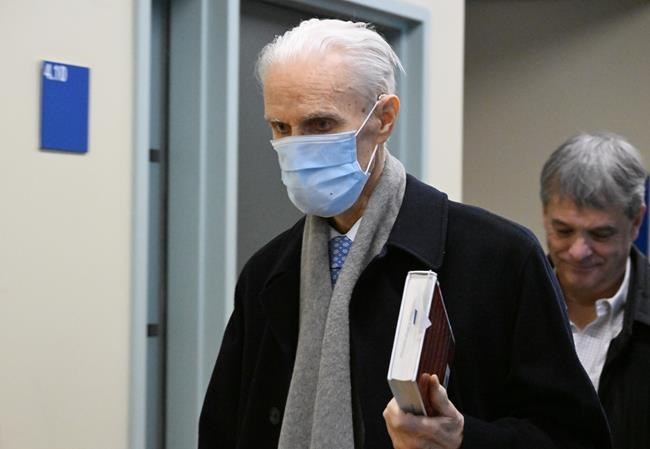QUEBEC — A retired Quebec judge who had been facing a second murder trial in his wife's 2009 shooting death pleaded guilty to manslaughter Thursday and walked free after spending a few hours in detention.
Jacques Delisle was sentenced to one additional day in prison -- plus the nearly nine years he had previously served -- and was released Thursday afternoon.
Earlier, Delisle's lawyer told a Quebec City courtroom that his client did not shoot Marie Nicole Rainville but caused her death by leaving a loaded gun next to her, at her request.
Rainville was struggling from the effects of a stroke that left her partly paralyzed and a broken hip that robbed her of her independence and her ability to enjoy life, lawyer Jacques Larochelle said.
"Mr. Delisle and Mrs. Delisle were part of the growing class of people, who are certainly the majority today in our society, who believe that a person who can no longer tolerate life, who no longer has a taste for living, who gets no pleasure from it, no satisfaction, but rather a quasi-permanent suffering, has the right to put an end to their days," Larochelle said.
Delisle was convicted in 2012 of fatally shooting his wife and was sentenced to life in prison with no chance of parole for 25 years. The former Quebec Court of Appeal judge spent nearly nine years behind bars before he was freed in 2021 when the federal justice minister ordered a new trial after reviewing evidence and concluding a miscarriage of justice had likely occurred.
On Thursday, Delisle, who wore a black suit and a tie, stood with his hands behind his back as Superior Court Justice Étienne Parent sentenced him to eight years and 311 days in prison — all but one of which he had previously served after his 2012 conviction.
The 88-year-old declined to address the court but could be heard asking, "Do you know when I'll be released?" as he was led away to detention.
Thursday's ruling puts an end to a legal process spanning more than 14 years with multiple appeals and reversals.
During Rainville's autopsy, a pathologist failed to photograph the brain or take samples that would have shown traces of the bullet that killed her. Delisle's lawyers argued this evidence would have allowed them to prove that Rainville had died by suicide because of the trajectory of the bullet.
Larochelle painted his client as a loving husband and caregiver to the ailing Rainville but acknowledged he had taken a more active role in her death than previously admitted to police.
While Delisle originally told officers he had left the loaded gun on a table and Rainville had found it, he admitted Thursday that Rainville had convinced him to load the weapon and bring it to her from another area in the home so she could end her life.
While Larochelle said Delisle tried to convince her otherwise, in the end, "He did it, he left her the gun." He then left the home for an hour and returned to find her dead, the lawyer said.
Crown prosecutor François Godin said he did not agree with the defence's version of events but supported the manslaughter plea, which would eliminate the need for a second murder trial.
During the trial, the Crown argued that Delisle shot his wife to avoid a costly divorce and that he had wanted to move in with his former secretary, with whom he was having an affair.
Godin said Thursday that he believed it would still have been possible to convict Delisle of murder in a second trial, but he also acknowledged the problems with the missing evidence that led a Quebec Superior Court judge to stay the case in 2022, after former federal justice minister David Lametti ordered the new trial.
Quebec's Court of Appeal reversed the stay, in a decision that paved the way for a second trial. The Supreme Court of Canada was asked to weigh in, but it removed the case from its schedule after the two parties agreed on a plea.
Speaking after the verdict, Larochelle described the trial's conclusion as a "triumph of reason."
“Given his age, the difficulty of a new trial, given that there were many obstacles ahead of a new triaI, I don’t want to speak for the Crown but I think they simply thought it lasted long enough, and we could, honourably, finish with a compromise,” he said.
Patrick Michel, the head of the province's Crown prosecutor's office, said the Crown didn't believe Delisle's story but agreed to make a deal for the reasons Larochelle cited, and because Delisle took responsibility.
"Although the conclusion of the first trial is, in our opinion, more representative of the truth, we recognize the importance of the acknowledgment of guilt of Jacques Delisle for the outcome of this affair," he told reporters.
This report by The Canadian Press was first published March 14, 2024.
— By Morgan Lowrie in Montreal
The Canadian Press



